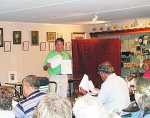Preserving a papered past

By Nancy Malcom
Nevada Daily Mail
The Bushwhacker Museum hosted an all-day workshop conducted by Lisa Fox, senior conservator of the Missouri State Archives on Tuesday, Aug 31, at the Bushwhacker Museum.
"These workshops are mandatory for groups receiving state grants to preserve archival materials," explained Terry Ramsey, museum coordinator. She added that people who work at the State Archives department, realized that most museums and other small groups dedicated to preserving historical materials, were volunteers and usually had no training in preservation or restoration. Such workshops were developed in order to demonstrate how small groups with limited funds and well-trained volunteers can preserve valuable documents.
The workshop concentrates on archival paper materials such as maps, documents, letters and photos.
"When you hear the phrase 'they wrote the book on that'," Ramsey said with a smile, "we all know that means that person is very knowledgeable in that field. Lisa Fox wrote the manual for the United States Navy for their archives." She added, "This is going to be a great workshop and we should learn a lot." Ramsey explained that the grants are usually small, but what is accomplished with that amount might determine future expectations on getting more.
"We used the $5,000 grant for the storage equipment and archival materials," she said. "The volunteers have done all of the work." To afford to hire professionals to do the work, larger grants would have been needed. "Any grant over $5,000, you have to come up with matching funds," Ramsey explained. "We just don't have those resources. So we get smaller amounts and do the work ourselves."
Writing the grant for $4,495.55, she avoided the extra costs of coming up with matching funds. The money was used to buy supplies and equipment needed to do the archiving. Many hours of volunteer work were needed to actually put the equipment to use.
"Thousands of photos and papers are now accessible," Ramsey added. "Now we know what we have and can find it when people want it. We are at that stage where we can clean and assession (or, include a history and description) of inventoried items and they will still be legible 200 years from now."
She grinned, "Even with that, we still have several thousand items left to do." Ramsey said that at the Missouri State Archives state treasures there are protected by climatically controlled areas and other extensive methods.
"Their preservation department is like a lab, everything is there to treat different types of papers. It's just fascinating. But even they have the same problems as small museums," Ramsey said.
She then related a story told by Fox about them finding an old box labeled "Interesting old papers" No one knew what was in it, who had labeled it, or where it came from. When they opened it they found the enlistment papers for the first black troops in the Civil War for the state of Missouri.
Ramsey praised the state archive department for their availability. "when I have called them with a question, the response is immediate. They may not have the answer, but they will start directing experts to me and they contact me to answer my question. They know who to call to get back to me with the right answers on what to do and what not to do." The State Archives' workers realize that although the state has a complete set-up for preservation, most small groups and museums do not. "They know what to do in 'a perfect world' but they all know we live in a different world," Ramsey explained.
"They will help you work with what you can do in your situation and that's where they have been so helpful to us." Ramsey stressed that the success of the archiving attempts of the Bushwhacker Museum has been as successful as it has only because of the volunteers who put in the thousands of hours on the project. She feels there is nothing more priceless than "having people willing to take the time and effort to do it, and understand the value of doing it."
The Bushwhacker Museum was selected as the location for the workshop because it is considered a fine example of what can be done using a small grant efficiently.
More than two dozen people attended from several southwestern Missouri counties, including Taney, Berry, Jackson, and Vernon.
